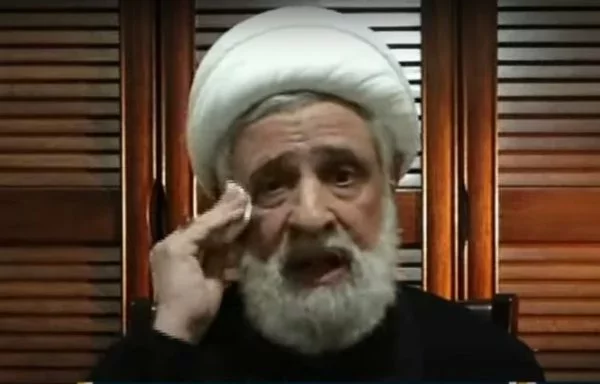Politics
Hizbullah's new leader-by-default Naim Qassem is 'symbol of party's bankruptcy'
The Hizbullah deputy, who is regarded as a mouthpiece for the Iranian regime, was forced into the leadership role due to a paucity of options.

By Nohad Topalian |
BEIRUT — Newly appointed Hizbullah chief Naim Qassem was chosen by default to fill the shoes of Hassan Nasrallah, reflecting a dearth of viable alternatives within the party's decimated leadership structure, political analysts said.
As Hizbullah's deputy chief, Qassem automatically assumed the top leadership role as the party scrambled to replace Nasrallah, who was killed in a September 27 air strike in Beirut's southern suburb.
But as the party could find no viable alternative, he has retained the post.
Analysts predict no change in Hizbullah's course under Qassem, anticipating continued involvement in regional conflicts.
Qassem has pledged to keep fighting on the southern front, echoing the Iranian regime's stance while denying that Hizbullah acts on behalf of any nation other than Lebanon.
The new appointment deviates from Hizbullah's traditional succession process, Hizbullah critic Ahmad Yassin told Al-Fassel.
The party's Shura Council typically elects its secretary-general, he noted.
But after the deaths of Nasrallah and other council members, including Hashem Safieddine, Mustafa Badr and Fuad Shukr, he said, only Qassem and two other sheikhs, Muhammad Yazbek and Ibrahim Amin al-Sayyid, remained.
Security concerns prevented the Shura Council from convening, Yassin said, resulting in Iranian leader Ali Khamenei appointing Qassem by letter.
Qassem was unaware of the appointment beforehand, he said.
Weak leadership
Yassin said the Iranian regime prefers a weak Hizbullah chief to maintain control over the party and the ongoing conflict with Israel, adding that it seeks to buy time and wear down opponents to gain leverage in future negotiations.
He said he interprets Qassem's vow to keep fighting as a sign of Hizbullah's indifference to the Lebanese people's desire for peace and an end to the displacement crisis.
And he views Qassem's denial of the Iranian's regime's influence as an attempt to manage public perception.
Qassem's appointment stems from a lack of alternatives, analyst Bishara Khairallah said, especially after Yazbek and al-Sayyid hesitated to take the post.
His commitment to continuing the war aims to appease Hizbullah's supporters while following the course set by Khamenei, he told Al-Fassel.
Khairallah describes Qassem as a symbol of "Hizbullah's bankruptcy" and a mouthpiece for the Iranian regime, forced into the leadership role due to a paucity of options.
He dismisses Qassem's claim that Hizbullah is defending Lebanon as implausible, asserting that Tehran dictates Qassem's decisions.
And he predicts that under Qassem, Hizbullah will keep entangling Lebanon in conflict, causing more destruction and displacement, despite the population's yearning for peace.
I don't like what it says.
Let us see the truth of this talk in a month or two when the party of Satan stops paying the salaries of its fighters, then they will drown in the filth of this liar who is talking. In addition to that, when the party of Satan soon hands over its weapons to the Lebanese state, it will no longer be able to control the people of the [southern Beirut] suburb and force them to say what it wants under threat, then the world will know the value of this speaker and the value of the party.
♥️
May God bless you